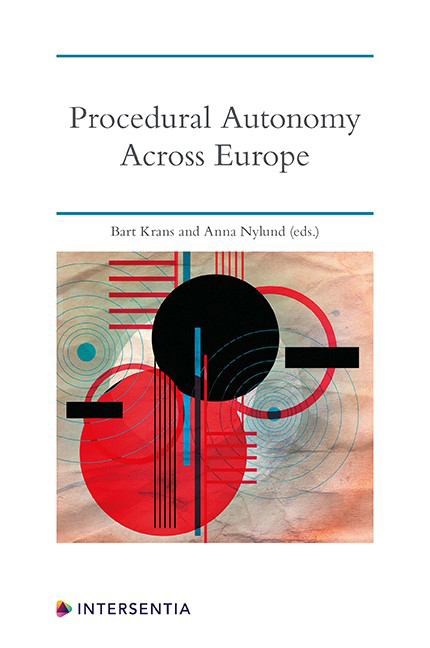Book contents
- Frontmatter
- Preface
- Contents
- Table of Cases
- List of Authors
- Aspects of Procedural Autonomy
- Procedural Autonomy and Belgian Civil Procedure Law: A Turbulent Cohabitation
- The English Approach to Procedural Autonomy
- The Finnish Way of Understanding Procedural Autonomy: A Practical Approach to Implementing EU Civil Procedural Law
- A German Perspective on the Waning Procedural Autonomy in Civil Matters: Who is Afraid of European Civil Procedure?
- Procedural Autonomy in the Netherlands: A Fading Relic?
- Procedural Autonomy, the EEA Agreement and Norwegian Law: The Art of Bridging a Gap and Maintaining it Too
- A Polish Perspective on Collective Civil Proceedings: Reluctance to Follow EU Recommendations?
- Procedural Autonomy between EU Law and the Slovenian Law of Civil Procedure
- Autonomy of the Spanish Legislator in the Regulation of Procedural Law: The Borders of European Case Law
- Procedural Autonomy in Sweden: Is Materielle Prozessleitung the Answer?
- Comparative Insights on Procedural Autonomy
- Index
- ABOUT THE EDITORS
The Finnish Way of Understanding Procedural Autonomy: A Practical Approach to Implementing EU Civil Procedural Law
Published online by Cambridge University Press: 30 April 2020
- Frontmatter
- Preface
- Contents
- Table of Cases
- List of Authors
- Aspects of Procedural Autonomy
- Procedural Autonomy and Belgian Civil Procedure Law: A Turbulent Cohabitation
- The English Approach to Procedural Autonomy
- The Finnish Way of Understanding Procedural Autonomy: A Practical Approach to Implementing EU Civil Procedural Law
- A German Perspective on the Waning Procedural Autonomy in Civil Matters: Who is Afraid of European Civil Procedure?
- Procedural Autonomy in the Netherlands: A Fading Relic?
- Procedural Autonomy, the EEA Agreement and Norwegian Law: The Art of Bridging a Gap and Maintaining it Too
- A Polish Perspective on Collective Civil Proceedings: Reluctance to Follow EU Recommendations?
- Procedural Autonomy between EU Law and the Slovenian Law of Civil Procedure
- Autonomy of the Spanish Legislator in the Regulation of Procedural Law: The Borders of European Case Law
- Procedural Autonomy in Sweden: Is Materielle Prozessleitung the Answer?
- Comparative Insights on Procedural Autonomy
- Index
- ABOUT THE EDITORS
Summary
In Finland, procedural autonomy is not a widely discussed subject. Thus, EU legislation is followed (and technically adhered to) in case law without substantial problems and without broad substantive discussions. There is not much discussion of procedural autonomy among legal scholars, either. In this chapter, an attempt will be made to map the current lay of the land as far as the limited discussion is concerned. The chapter will also try to find some answers to the question of why the Finnish discussion has been relatively so quiet. These answers can partly be found in the Finnish way of seeing legislation as a tool for organising common life in society combined with a tendency to approach especially procedural law from an instrumental point of view. Other reasons include differences in legal culture; Finns tend to readily adopt and apply legal concepts without extensive prior critical discussion thus favouring a stable national legal policy.
BACKGROUND
As mentioned above, in Finland, the principle of procedural autonomy is not widely debated, neither in doctrine nor in case law. Likewise, there is little evidence of Euro-scepticism among legal scholars. Especially not among experts in procedural law. One reason for this could be that Finland is a small country without many legal experts, which means that not all topics can be discussed due to a lack of human resources. Another reason could be differences in culture. Finns seem to adopt legal measures easily and tend to act operationally instead of discussing critically, in the sense that they prefer a stable national legal policy. A third reason could be the way procedural law is seen from a Finnish perspective. If seen from a practical point of view, the law has an instrumental perspective in proceedings. This means that procedural problems are principally tackled through practical solutions rather than through a system that seeks to uphold a purely procedural system. All of this is important to keep in mind whenever procedural autonomy is discussed – or not discussed, and in Finland in-depth critical discussion on this topic is notably lacking. Instead, EU policy is readily accepted by the legal system which strives to follow EU law correctly and which strives to technically comply with the relevant regulation.
- Type
- Chapter
- Information
- Procedural Autonomy Across Europe , pp. 57 - 80Publisher: IntersentiaPrint publication year: 2020
- 2
- Cited by



